

PRESIDENTIAL CANDIDATES @AnonDr_X.
Contact US Department Of State. Bureau Of Diplomatic Security. Bill of rights. Bills of rights may be entrenched or unentrenched.
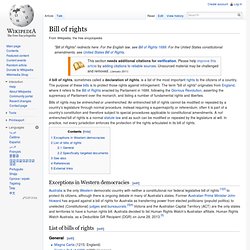
An entrenched bill of rights cannot be modified or repealed by a country's legislature through normal procedure, instead requiring a supermajority or referendum; often it is part of a country's constitution and therefore subject to special procedures applicable to constitutional amendments. A not entrenched bill of rights is a normal statute law and as such can be modified or repealed by the legislature at will. In practice, not every jurisdiction enforces the protection of the rights articulated in its bill of rights. Exceptions in Western democracies[edit] Australia is the only Western democratic country with neither a constitutional nor federal legislative bill of rights [1][2] to protect its citizens, although there is ongoing debate in many of Australia's states. List of bills of rights[edit] General[edit] Specifically targeted documents[edit] See also[edit] References[edit] External links[edit] United States Bill of Rights. The Bill of Rights is the collective name for the first ten amendments to the United States Constitution.
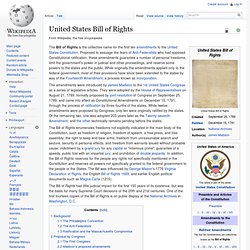
Proposed to assuage the fears of Anti-Federalists who had opposed Constitutional ratification, these amendments guarantee a number of personal freedoms, limit the government's power in judicial and other proceedings, and reserve some powers to the states and the public. While originally the amendments applied only to the federal government, most of their provisions have since been extended to the states by way of the Fourteenth Amendment, a process known as incorporation. The amendments were introduced by James Madison to the 1st United States Congress as a series of legislative articles. Jefferson's Manual. Manual of Parliamentary Practice for the Use of the Senate of the United States, written by Thomas Jefferson in 1801, is the first American book on parliamentary procedure.
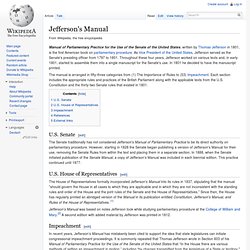
As Vice President of the United States, Jefferson served as the Senate's presiding officer from 1797 to 1801. Throughout these four years, Jefferson worked on various texts and, in early 1801, started to assemble them into a single manuscript for the Senate's use. In 1801 he decided to have the manuscript printed. The manual is arranged in fifty-three categories from (1) The Importance of Rules to (53) Impeachment. Social Security Act of 1965. History[edit] Many politicians were involved in drafting the final bill that was introduced to the United States Congress in March 1965.
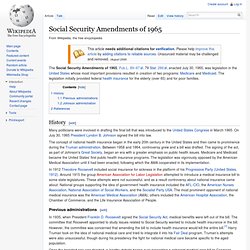
On July 30, 1965 President Lyndon B. Johnson signed the bill into law. The concept of national health insurance began in the early 20th century in the United States and then came to prominence during the Truman administration. Between 1958 and 1964, controversy grew and a bill was drafted. Previous administrations[edit] In 1935, when President Franklin D. In 1960, the Kerr-Mills Act created the Medical Assistance for the Aged (MAA) program which gave states the power to decide which patients needed financial assistance.
Johnson administration[edit] Medicare (United States) A sample Medicare card.
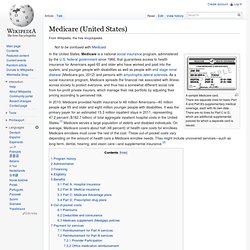
There are separate lines for basic Part A and Part B's supplementary medical coverage, each with its own date. There are no lines for Part C or D, which are additional supplemental policies for which a separate card is issued. In the United States, Medicare is a national social insurance program, administered by the U.S. federal government since 1966, that guarantees access to health insurance for Americans aged 65 and older who have worked and paid into the system, and younger people with disabilities as well as people with end stage renal disease (Medicare.gov, 2012) and persons with amyotrophic lateral sclerosis.
As a social insurance program, Medicare spreads the financial risk associated with illness across society to protect everyone, and thus has a somewhat different social role from for-profit private insurers, which manage their risk portfolio by adjusting their pricing according to perceived risk. Medicare has several sources of financing. or.
Republican Party (United States) History Founding and 19th century The first official party convention was held on July 6, 1854, in Jackson, Michigan.
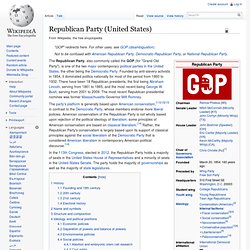
By 1858, the Republicans dominated nearly all Northern states. The Republican Party first came to power in 1860 with the election of Lincoln to the Presidency and Republicans in control of Congress and again, the Northern states. It oversaw the saving of the union, the end of slavery, and the provision of equal rights to all men in the American Civil War and Reconstruction, 1861–1877.[16] The Republicans' initial base was in the Northeast and the upper Midwest. Early Republican ideology was reflected in the 1856 slogan "free labor, free land, free men", which had been coined by Salmon P.
The GOP supported business generally, hard money (i.e., the gold standard), high tariffs to promote economic growth, high wages and high profits, generous pensions for Union veterans, and (after 1893) the annexation of Hawaii. 20th century Warren G. 21st century Electoral history.